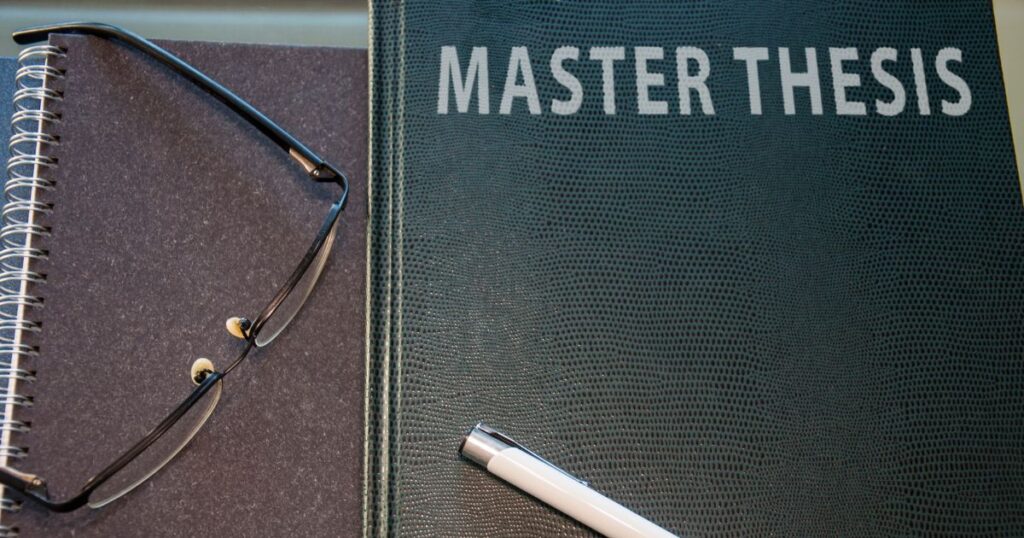Are you about to embark on the challenging task of writing your thesis? Do you hope to make your thesis excellent? Regardless of your field of study, avoiding mistakes is crucial to achieving top grades. This article outlines common thesis writing mistakes and how to avoid them. Let’s begin the journey towards an outstanding thesis!
Key Takeaways
- Avoiding common thesis writing mistakes is crucial for attaining academic excellence.
- Effective planning and organization can significantly enhance the quality of your thesis.
- A comprehensive and well-structured literature review is essential for a credible thesis.
- A strong and focused thesis statement is crucial for a successful thesis.
- Selecting appropriate research methods and accurately analyzing data is vital for the validity and reliability of your research.
Lack of Proper Planning and Organization
Writing a thesis can be challenging due to insufficient planning and organization. Without a solid plan, writing can feel overwhelming. In this section, we’ll provide tips for writing an effective thesis. These tips will help you stay organized and productive.
Create an Outline
Developing a well-thought-out outline is crucial before beginning your thesis. It serves as a map for your thesis, indicating what you will discuss. This structure helps you stay focused during your research and writing stages.
Set Deadlines
Establishing realistic deadlines is crucial for completing your thesis on time. Divide your work into tasks with designated times for researching, collecting data, writing, and editing. Deadlines keep you moving forward without losing pace.

Organize Your Research Materials
Organizing your research materials is essential. Use folders, bookmarks, or files to keep sources easily accessible.This organization will save time and simplify referencing while writing.
Tips for Thesis Writing: Proper planning and organization are vital for a good thesis.Outline your work, set deadlines, and keep your research organized. These steps make the writing journey smoother.
These best practices help avoid the traps of poor thesis planning. Next, we will explore a key area of thesis writing: conducting an in-depth literature review.
Poor Literature Review
A weak literature review can harm the credibility and quality of your thesis. It is key to do a thorough and structured literature review. This ensures your research is valid and relevant. Here, we’ll share tips to avoid common mistakes and make your literature review strong.
Start your literature review by choosing the right sources. Include scholarly articles, books, and trusted online sources related to your topic. This makes your thesis stronger and shows you’ve researched well.
Critical analysis is crucial in a good literature review. Don’t just summarize. Evaluate and compare different viewpoints in the literature. This helps spot gaps or inconsistencies in research. Use a critical eye to assess each source’s credibility and methods.
Structure Your Literature Review
Organize your literature review clearly. Begin with an introduction that outlines the review’s purpose and scope. This shows why your research matters.
Sort your sources by their relevance to your research question. This helps readers navigate and see how each source supports your thesis. Use headings and subheadings to organize your review and highlight key points.
Quote Relevant Studies
Including quotes from studies can improve the quality of your literature review. Choose quotes that are impactful and relevant to your topic.Always acknowledge the original authors and give proper credit. This enhances the credibility of your writing and demonstrates your engagement with the literature.
A strong literature review is essential to producing an excellent thesis. It provides your research with a solid theoretical foundation and demonstrates your deep understanding of the topic. Follow these tips to produce an exceptional literature review and thesis.
Ineffective Thesis Statement
The thesis statement is critical in writing a thesis. It serves as the foundation of your research. Unfortunately, many students struggle to craft their thesis statements, This can lead to papers that lack clarity and focus.
To create an effective thesis statement, consider these tips:
- Be clear and concise: A strong thesis statement directly states your main argument. **Avoid** unclear language or providing too much detail.
- Focus on a single idea: It should center on one main idea. **Avoid** mixing multiple ideas in one statement.
- Evidence-based and specific: Support your thesis statement should be evidence-based and specific. **Avoid** broad statements without providing detail.
- Avoid obvious statements: Offer a unique view: Avoid your topic. **Avoid** saying things everyone already knows.
- Revise and refine: Feel free to change your thesis as your research advances. It’s important to ensure your thesis still aligns with your findings.
By following these tips, you can avoid common errors in thesis writing mistakes. and produce a robust and focused thesis statement. That will serve as the foundation of an exceptional research paper.
Weak Methodology and Data Analysis
The methodology and data analysis sections are critical components of a thesis. They demonstrate how you collected and analyzed your data. It is crucial to execute this task precisely to ensure the integrity of your research.
Many students make mistakes in this section of their thesis. These thesis writing mistakes can affect their research findings. We have compiled some essential tips to help you avoid these errors. These tips will aid you develop a robust methodology and conduct a thorough data analysis.
Selecting Appropriate Research Methods
Selecting appropriate research methods is crucial for success. These methods must align with your research objectives. Consider your research question to determine whether you should use quantitative, qualitative, or mixed methods.
“The choice of research method ultimately depends on the research question being investigated. Each method has its strengths and limitations, so it is vital to carefully evaluate which approach will provide the most reliable and valid results. “
Make sure to explain why you chose a particular research method. Mention any limitations or biases that may exist. This demonstrates that you have thought critically about your choice and enhances your methodology.
Analyzing Data Accurately
Analyzing your data accurately is crucial. This is how you get meaningful insights. Here are some tips to avoid making common mistakes:
- Have a clear plan for analyzing your data. **Having a clear data analysis plan** keeps you on track. It makes sure you consider everything important.
- Use appropriate statistical tools and software for analysis. Knowing the limits of statistical tools and software is critical for obtaining accurate results.
- Explain how you analyzed your data, including any steps such as transformations or coding. This allows others to replicate your study.
- Don’t just select data that only supports your idea. Present all your data objectively to avoid bias.
Your data analysis should align with your research questions and goals, and you should present your findings in a clear and organized manner. Present your findings in a clear and organized manner. Use tables, graphs, or other visuals to assist.
For instance, let’s consider a study on how people shop online.You might use surveys and interviews to collect data. Then, use statistical methods such as regression analysis to determine what affects buying decisions.
Understanding and avoiding common thesis writing mistakes related to methodology and analysis are key to writing a successful thesis.Use our tips to make your thesis better. Your thesis can make a significant contribution to your field of study, so put in the effort to make it exceptional.
Conclusion
Writing a thesis is challenging, but you can excel by avoiding common mistakes. We’ve discussed the importance of planning, conducting a thorough literature review, crafting a strong thesis statement, and selecting appropriate research and analysis techniques. We’ve discussed the importance of planning, conducting a thorough literature review, crafting a strong thesis statement, and selecting appropriate research and analysis techniques. We’ve discussed the importance of planning, conducting a thorough literature review, crafting a strong thesis statement, and selecting appropriate research and analysis techniques.
Follow our advice to avoid making common mistakes in thesis writing. Plan carefully and review literature thoroughly. Incorporating these tips will improve your thesis.
A well-written thesis demonstrates your expertise and knowledge in your subject and impresses your professors. By avoiding these mistakes, you’ll impress your professors and make a valuable contribution to your field. Put in the effort to make your thesis exceptional and make a valuable contribution to your field.
FAQ
What are some common mistakes to avoid when writing a thesis?
To write a successful thesis, avoid these mistakes: inadequate planning, a subpar literature review, a vague thesis statement, and insufficient research and analysis methods. Knowing these issues and best practices will enhance the quality of your thesis.
How crucial is proper planning and organization in writing a thesis?
Effective planning and organization are essential in thesis writing. Create an outline, establish deadlines, and organize your research. This ensures a smooth writing process and helps you stay focused.
What tips are there for conducting a comprehensive literature review?
To conduct a thorough literature review, select relevant sources and analyze research critically. Organize your review effectively, Ensure that your sources are credible to bolster this section.
How can I craft an effective thesis statement?
An effective thesis statement should be clear, concise, and focused. Avoid using vague statements, It should reflect your primary argument.Revise it as you progress through your research.
What should I consider when selecting research methods and analyzing data?
Consider your research goals, resources, and data type when selecting methods and analyzing data. Choose methods that align with your aims. Make sure your data analysis.
What are some ways to avoid common mistakes in thesis writing?
Follow these best practices to steer clear of mistakes: plan effectively, conduct a comprehensive literature review, craft a strong thesis statement, and choose the right research methods. Feedback from advisors and peers can also help spot issues.
Why is it crucial to avoid common mistakes in thesis writing?
Avoiding common thesis mistakes is crucial because it boosts your research’s credibility and quality. By steering clear of these errors, your thesis will be well-supported and demonstrate your academic skills.


Pingback: Top 10 Strategies for a Successful PhD Thesis: Research & Writing